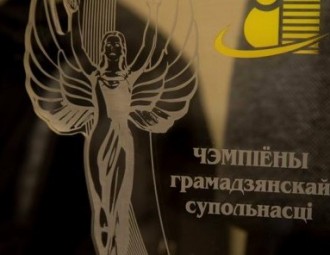NGOs recognized Sviatlana Alexievich to be the public leader 2015

On January 15 Minsk hosted the 7th “Civil Society Champions” Award Ceremony.
The Award was founded by the Assembly Of Pro-Democratic NGOs Of Belarus. Traditionally, champions were determined by results of joint vote count submitted by the 43 representatives of the Assembly’s working group as well as 71 specially invited expert from the leaders of NGOs organizations, journalists, and former winners of the award.
The Award is given to the prominent personas, organizations, as well as events that were crucial for the development of the Belarus’ third sector last year.
This year the Award was presented in nine nominations: eight positive and one negative.
The most prestigious award – the Civil Leader of the Year – was quite expectedly given to Sviatlana Alexievich, the winner of the Nobel Prize in Literature 2015. According to the organizers of the Award Ceremony, the fact that the writer received the prestigious international award united Belarusans and the writer’s civic stand made Belarusans think about the situation in their country.
In the Campaign of the Year nomination, solidarity campaign with the cadets of the Brest oblast cadet school was awarded. In October the photo of four cadets in T-shirts with the “Pahonia” coat of arms underneath their uniform were published (“Pahonia” is the unofficial unrecognized symbol of independent Belarus that used to be the coat of arms of the Republic of Belarus from 1991 to 1995 – EuroBelarus). Many media published this photo, which led to the information about the possible dismissal of the cadets from the school appeared. The organizer of the solidarity campaign – “Art Siadziba” – (Belarusian “Art Manor” – EuroBelarus) suggested organizing the action #PahoniaPobach (Belarusian “Pahonia is near” – EuroBelarus) in social networks. People can post their own photos with the Pahonia symbol and describe their attitude to the national emblem.
The award in the “New Initiative” nomination was given to a series of performances in support of the disabled organized by the theatre laboratory Fortinbras at the Belarusian Free Theatre. The participants of the action on December 24-25 attracted attention of the authorities and Minsk citizens because the city remains close for the disabled. For example, on December 25 wheelchair users in Santa Clauses costumes wanted to join the march of Fathers Frost and Snow Maidens, but Minsk authorities prevented them from doing it.
The Regional Event of the Year was the protection of the lake Bolduc from the church that should have been constructed on the bank of the lake. This action was initiated by EcoDom International Charitable NGO and Green Network Partnership of Environmental Organizations.
The award in the “Partnership of the Year” nomination was given to the humanitarian route initiative “Belarus-ATO”. Within the frames of this initiative Belarusans together with Ukrainian volunteers have been providing humanitarian aid to Ukraine’s southeast.
The award “Creative Input of the Year” went to the Street Art Fest Urban Myths that decorated Minsk with unusual for Belarus graffiti on the buildings.
Anton Motolko, a blogger and urban activist, won in the Media/Journalist of the Year nomination for versatile and thorough coverage of civic activity in mass media and the Award jury chose adukacyja.info
as the Best NGO website of the Year.
The Screw Up of the Year “anti-award” went to the Information Ministry. It was this department that issued an order to destroy the books of the late political scientist Vitaly Silitski "Long road to tyranny: the post-communist authoritarianism and the struggle for democracy in Serbia and Belarus."
-
03.01
-
07.10
-
22.09
-
17.08
-
12.08
-
30.09



























